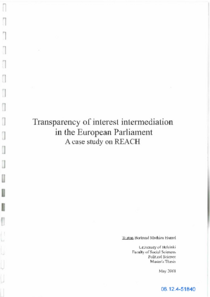Transparency of interest intermediation in the European Parliament : a case study on REACH

University of Helsinki - Helsinki
2008
101 p.
chemicals ; EU Parliament ; EU Regulation ; interest group ; REACH Regulation
Chemicals
English
Bibliogr.
"The main objective of this Master's thesis is to draw a link between the level of transparency in the European Parliament and the strategies adopted by lobbyists before the MEPs. In this Master's thesis, it is explained that transparency is a necessary condition to effective democracy. In the context of democratic accountability, transparency should be understood as inwards and ex-post disclosure of information. Once these precisions brought, a cost-based approach of the concept is proposed in order to bring explanations to the current lack of transparency in the European Parliament. In addition, a review of the previous literature on lobbying in the EU aims at outlining the elements that should be taken in consideration to build a model of lobbying in the European Parliament. The classic distinction between diffuse and concentrate interests is underlined as an important factor. Standing committees of the European Parliament are the main arena for lobbyists. Through these committees, they intend to introduce amendments by providing assistance to MEPs, although concentrate interests' groups are better armed for this.
A model of lobbying in the European Parliament based on a classic supply-demand pattern takes all these elements in consideration. The model represents progress achieved on different issues of interest by the MEPs according to the strategies adopted by lobbyists on these issues. Two strategies are compared: assistance of MEPs through legislative subsidy or pressure from the outside through grassroots campaigns. By inserting an additional factor to represent the level of transparency, it is defended that a lack of transparency impedes outside pressure of MEPs and promotes the use of a more consensual strategy, namely legislative subsidy. Such a situation puts additional burdens on interest groups defending diffuse types of interests and favors those defending concentrate interests. In addition, the model predicts that lobbyists can hardly opt for greater transparency without bearing the risk to reduce the chances of success of their enterprise in the European Parliament.
In order to strengthen the model, its assumptions and predictions have been tested in an empirical research conducted on REACH in the European Parliament. The research combines both quantitative and qualitative elements. A preliminary analysis of the amendments tabled in first reading serves as an indirect indicator of the significance of lobbying and outlines the role of lobbyists in the draft of amendments. This first step is completed by the analysis of the data gathered through interviews of MEPs and lobbyists. The different aspects treated in the interviews have generally brought support to an interpretation of lobbying in the European Parliament as a form of legislative subsidy and linked it with the low level of transparency."
Digital
The ETUI is co-funded by the European Union. Views and opinions expressed are however those of the author(s) only and do not necessarily reflect those of the European Union or the ETUI.